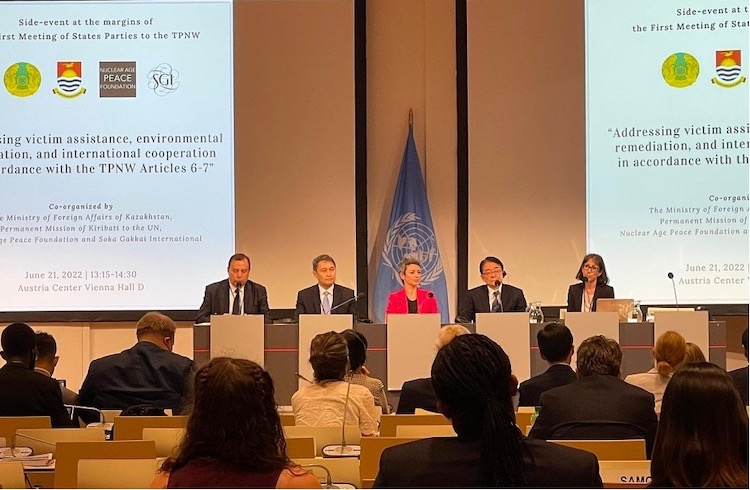By Aurora Weiss
VIENNA (IDN) — “Today is a historic moment,” are the words with which the First Meeting of States Parties to the Treaty on the Prohibition of Nuclear Weapons (TPNW) opened in Vienna on June 21. Representatives of the international community, government, civil society and academia gathered here to put into effect the historic Treaty and to shape the future of nuclear disarmament.
Regardless of national interests or belief systems, there is meanwhile agreement that what was considered illusory a decade ago, has become a stark reality. The big powers are in possession of some of the most catastrophic nuclear weapons ever created. |HINDI | JAPANESE | SPANISH|
It was appropriate therefore that a side event at the margins of the First Meeting of TPNW States Parties’ First Meeting drew the focus on addressing victim assistance, environmental remediation and international cooperation in accordance with Articles 6 and 7 of the Treaty.
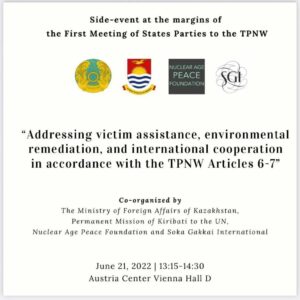
It was co-organized by the Ministry of foreign affairs of Kazakhstan, the Permanent Mission of Kiribati to the UN, the Nuclear Peace Age Foundation and Soka Gakkai International (SGI).
Kairat Sarzhanov, Director of the International Security Department at the Ministry of Foreign Affairs of the Republic of Kazakhstan, stressed the importance of this side event and thanked the Republic of Kiribati, Nuclear Age Peace Foundation and Soka Gakkai for their support in co-organizing a meaningful event.
SGI was represented by Hirotsugu Terasaki, vice president of Soka Gakkai. Director of Toda Peace Institute Hideki Sakomoto and Chairperson of Komeito Council for Elimination of Nuclear Weapons Masayoshi Hamada also arrived from Japan on this occasion.
Addressing the event, Mr Terasaki said it was a great honour to join the co-sponsors of the side event at the First Meeting of States Parties to the Treaty on the Prohibition of Nuclear Weapons. On behalf of Soka Gakkai International, he emphasized that Articles 6 and 7, which are the theme of the event, symbolize the universal values of the Nuclear Convention. Just before the event, Kazakhstan Foreign Minister Mukhtar Tleuberdi expressed his gratitude to the SGI for the promotion of peace.
Addressing the event, Mr Terasaki said it was a great pleasure to be present at the First Meeting of States Parties to the Treaty on the Prohibition of Nuclear Weapons. On behalf of Soka Gakkai International, he emphasized the values he shares with the victims affected by the consequences of testing and use of nuclear weapons. Just before the event, Kazakhstan Foreign Minister Mukhtar Tleuberdi expressed his gratitude to the SGI for the promotion of peace.
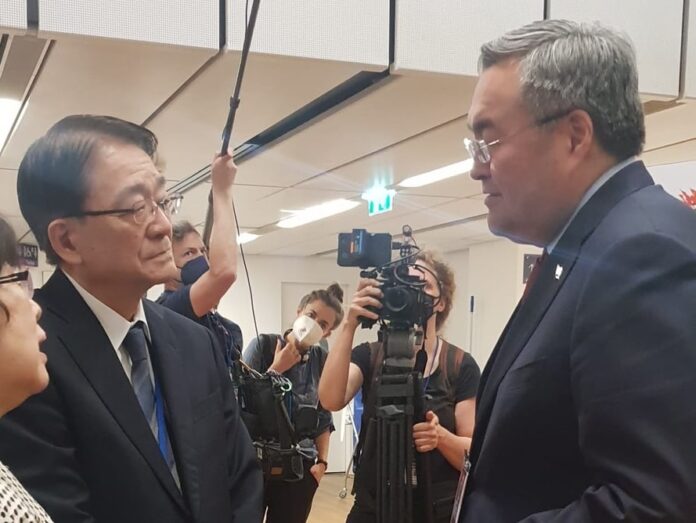
Upholding the ultimate respect for human dignity, SGI is therefore an active member of the International Campaign to Abolish Nuclear Weapons (ICAN). SGI activities for nuclear abolition originate from the 1957 anti-nuclear declaration made by the second president of the Soka Gakkai, Josei Toda, to 50,000 young people in Yokohama, Japan. In his declaration, Toda condemned nuclear weapons which threaten humanity’s right to live as an embodiment of the bleakest aspects of the human heart and called on the youth of the Soka Gakkai to take up the challenge of abolishing them.
Soka Gakkai Youth Division even published 2017 a book, Hiroshima and Nagasaki: That We Never Forget. Over 50 hibakusha, survivors of the atomic bombs dropped on Hiroshima and Nagasaki on August 6 and 9, 1945 give vivid testimony of living through the nightmare of those fateful days and their hellish aftermath. (You may download the book here: https://cdn2.assets-servd.host/un-sgi/production/assets/downloads/Hiroshima-and-Nagasaki-book.pdf)
The Soka Gakkai is a global, community-based Buddhist organization with a membership of over 12 million people around the world that promotes peace, culture and education centred on respect for the dignity of life. The Soka Gakkai International (SGI) as a non-governmental organization has been in consultative status with the United Nations Economic and Social Council (ECOSOC) since 1983. The SGI Office for UN Affairs operates in New York and Geneva, representing the SGI at the UN.
Victims of nuclear weapons testing also shared their shocking experiences at the side event. During the Soviet era, Moscow tested nuclear weapons in Kazakhstan. Karipbek Kuyukov, an artist and nuclear nonproliferation activist, with whom we had the opportunity to talk, also personally testified about the terrible consequences of nuclear tests.
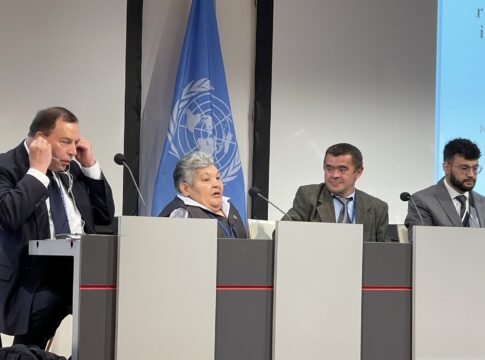
His physical deformity and the fact that he was born without arms he attributes to the nuclear tests that took place in his village in central Kazakhstan. He describes how he and other locals often saw a mushroom-shaped explosion, how the furniture in the house shook, they felt an iron taste in their mouths, headaches, and their teeth and hair fell out. After the explosion, it looked apocalyptic! Dead birds lay in the street, hairless dogs walked around. Animals were born with several heads and legs, and deformed children were born who often did not survive the very first year of their life.
“Radiation does not affect in the way it can be seen, but it enters the body very quickly. Its devastating consequences are thus passed on to generations,” said Karipbek Kuyukov pointing out the fatal effects of weapons that genetically kill new generations.
Dmitriy Vesselov (Kazakhstan), who inherited from his parents and now suffers from nuclear weapons testing, says doctors could not tell him whether his children would bear the consequences, and the decision not to have children was the worst thing he faced.
Bonnie Docherty, Associate Director of Armed Conflict and Civilian Protection and a Lecturer on Law at the International Human Rights Clinic, focused on Articles 6 (Victim Assistance and Environmental Remediation) and 7 (International Cooperation and Assistance). For example, victim assistance should include but is not limited to medical care, rehabilitation, and psychological support, provision for social and economic inclusion, acknowledgement of harm, and promotion of victims’ human rights. The biggest problem raised by the present victims is the lack of free health care as well as its temporary absence.
“Each State Party shall, with respect to individuals under its jurisdiction who are affected by the use or testing of nuclear weapons, in accordance with applicable international humanitarian and human rights law, adequately provide age and gender-sensitive assistance, without discrimination, including medical care, rehabilitation and psychological support, as well as provide for their social and economic inclusion,” concluded Docherty.
“There are no right hands that can handle the wrong weapons.”
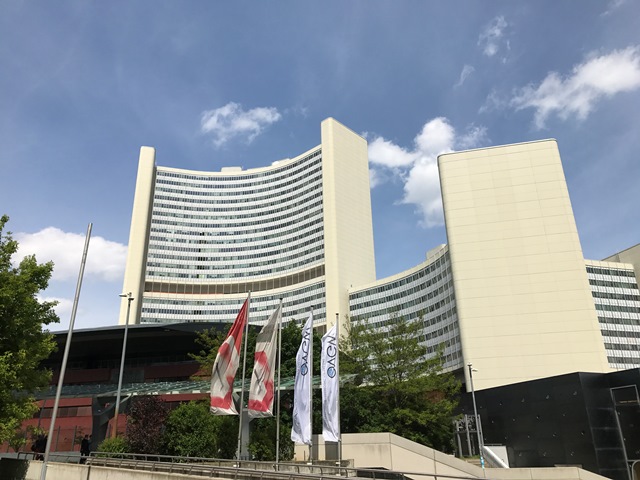
Kazakhstan and Kiribati have together proposed the implementation and promotion of Articles 6 and 7 of the TPNW. Therefore, we have brought together experts and civil society in drafting a working document as the outcome of the event. Our efforts should be focused on all forms of victim assistance, physical, psychological, as well as financial compensation
In his opening speech at the TPNW First Meeting of States Parties, Austrian Foreign Minister Alexander Schallenberg pointed out that nuclear risks have not been this high for decades and that’s why he called for responsibility to draw the right lessons.
“This is no time to celebrate. War has returned to Europe. And the shockwaves of this war of aggression can be felt around the globe. But not only that, Russia’s brutal invasion of Ukraine has been accompanied by explicit threats of the use of nuclear weapons. This is blatant nuclear blackmail! It is a clear violation of the UN Charter, completely irresponsible and utterly unacceptable!” stressed Schallenberg. Besides, the current situation has put one truth sharply into focus: as long as these horrendous weapons exist, they will remain “a threat to us all”.
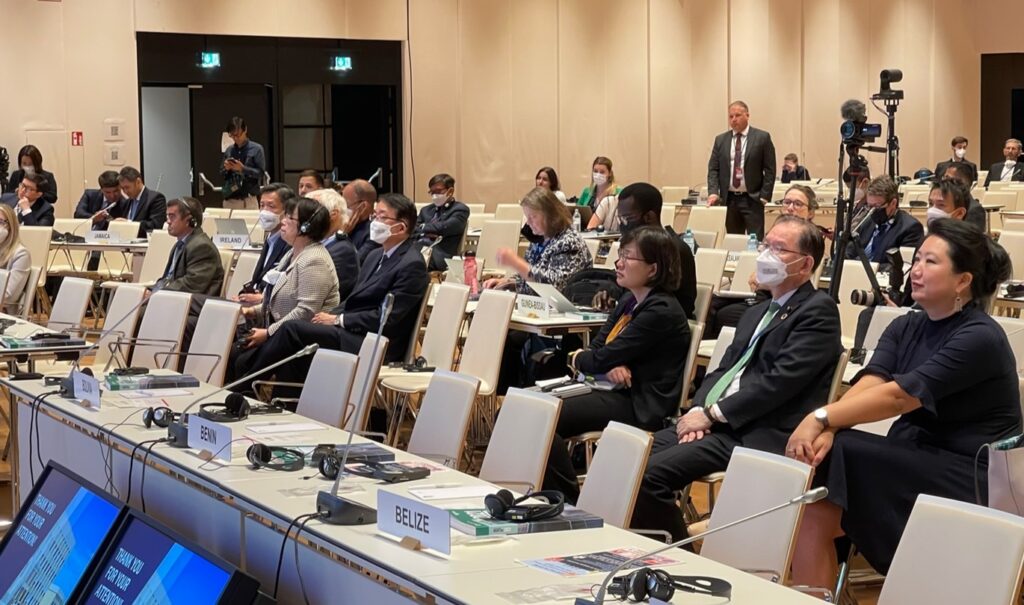
He pointed out that we must counter the narrative that any possession of nuclear weapons is legitimate, and unacceptable because of the humanitarian risks and consequences. As former UN Secretary-General Kofi Annan put it: “There are no right hands that can handle the wrong weapons”.
In a video message, UN Secretary-General António Guterres pointed out that Nuclear Weapons Disarmament is everybody’s business because life itself is everybody’s business. “It is only by joining in solidarity that we can eliminate this scourge and get back to the business of building a better, more peaceful and trusting world for all. Let’s eliminate these weapons before they eliminate us.” [IDN-InDepthNews – 21 June 2022]


